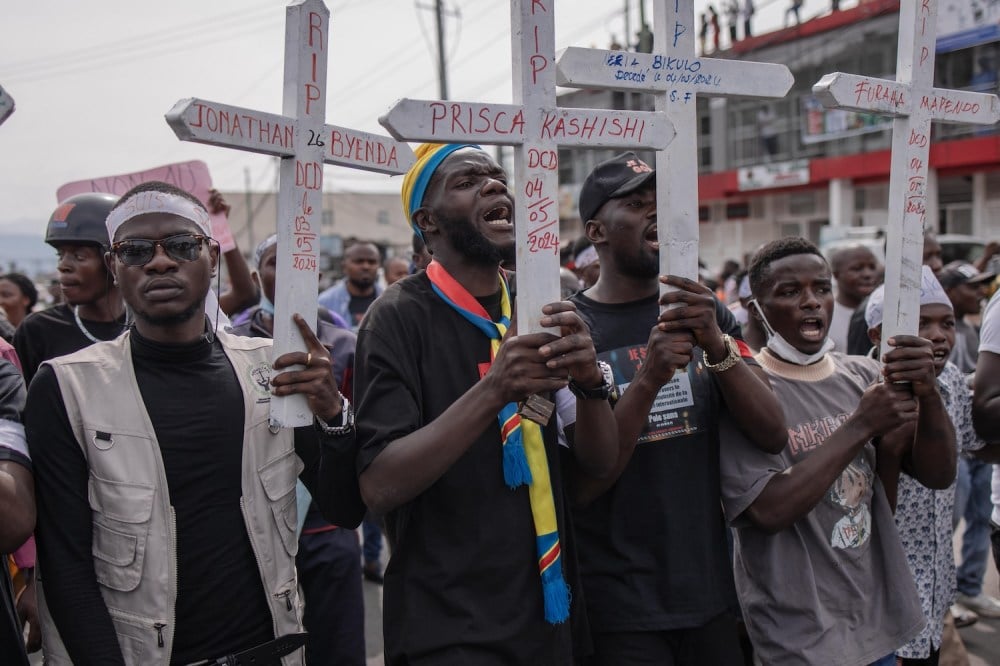This year marks 30 years since the Rwandan genocide in 1994, when a Hutu-majority government and a privately owned radio station with close ties to the government colluded to murder 800,000 people.
The year 1994 may seem recent, but for a continent as young as Africa (where the median age is 19), it’s more like a distant past.
Suppose this had happened today, in the age of the algorithm. How much more chaos and murder would ensue if doctored images and deepfakes were proliferating on social media rather than radio, and radicalizing even more of the public? None of this is beyond reach, and countries including the Democratic Republic of the Congo, Ethiopia, and Niger are at risk—owing to their confluence of ethno-religious tensions, political instability, and the presence of foreign adversaries.
Removed by mod
You are not trying to have a reasonable discussion here.
Sure US has its record like any empire, which is not cool.
However , in another comment you are passive justifying Russian behavior in one of the few situations where US is not the bad guy geopolitically.
Is there a way to explain Russian behavior besides imperialism?
While I agree with the sentiment here, this is pretty 1-dimensional. For one, US support of Ukraine actually has little to do with democracy and everything to do with national sovereignty. One nation with imperial ambitions invaded another nation without pretense, US provides aid to stave off that invasion.
Hypocritical given US history of imperialism? Sure. But it’s NOT imperialism under the mask of democracy.
Similar arguments apply to various points on this list. Supporting NATO is about maintaining a military alliance against common enemies, not spreading democracy.
Removed by mod
The copy paster accusing others of being brainwashed when they engage. Not surprising, it seems you have no point to make after all.
Foreign Policy – Bias and Credibility
Bias Rating: Least Biased
Factual Reporting: High
Country: USA
Press Freedom Rank: Mostly Free
Media Type: Magazine
Traffic/popularity: High Traffic
MBFC Credibility Rating: High Credibility
Ad Fontes Media Rating: Middle / Reliable
Archive Link: 21 Jun 2024 21:41:42 UTC
However, Wikipedia editors consider Media Bias/Fact Check as “generally unreliable”, recommending against its use for what some see as breaking Wikipedia’s neutral point of view.
I clicked your link. Not only is the quote you provided not actually present in your source, but the sentiment isn’t even there. The article is mostly about how reliable and consistent the website is.
Huh, that’s so, it was there last January. It used to follow this paragraph (still there today anyway), which contains a similar criticism with citation:
It is widely used and has sometimes been criticised for its methodology.[4] Scientific studies[5] using its ratings note that ratings from Media Bias/Fact Check show high agreement with an independent fact checking dataset from 2017,[6] with NewsGuard[7] and with BuzzFeed journalists.
So if those are considered fact-based, there’s no need to delve further.
When MBFC factualness ratings of ‘mostly factual’ or higher were compared to an independent fact checking dataset’s ‘verified’ and ‘suspicious’ news sources, the two datasets showed “almost perfect.”
I was trying to find the criticism you cited, but it must be buried somewhere under a mountain of praise. Could you explain what the nature of their complaint is? I’m out of the loop.
Haha, I was wondering when someone was going to point that outs You’ll notice both MBFC and Ad Fontes were given that status primarily due to being Self-Published. However I wouldn’t consider MBFC or Ad Fontes to be the end all be all perfectly authoritative source either.
I hadn’t been aware of the collaboration with the radio station until I watched the show Evil (episode 12).
It’s just a fun show, not political, but I’d recommend watching that episode. Not that it goes into great detail, but the acting and writing make it feel so much more understandable, how a radio host calling minorities cockroaches can really matter. Stochastic terrorism and all that.
I’m just getting into that show. I’d say it’s a lot more political (in a good way) than you give it credit for. And doesn’t shy away from its criticisms of Catholicism.
Thinking more on it, I suppose you’re right. A lot of the “politics” are specifically Church politics, but not all of them.
Here is a combined list of wars and conflicts initiated or significantly supported by the United States, with the stated reason being the promotion or defense of democracy:
-
Barbary Wars (1801–1805; 1815)
- Reason: Democracy.
-
Mexican-American War (1846–1848)
- Reason: Democracy.
-
Spanish-American War (1898)
- Reason: Democracy.
- Supported Countries: Cuba.
-
Philippine-American War (1899–1902)
- Reason: Democracy.
-
Bay of Pigs Invasion (1961)
- Reason: Democracy.
-
Dominican Civil War (1965)
- Reason: Democracy.
-
Lebanon Intervention (1982–1984)
- Reason: Democracy.
-
Invasion of Grenada (1983)
- Reason: Democracy.
-
Bombing of Libya (1986)
- Reason: Democracy.
-
U.S. Invasion of Panama (1989)
- Reason: Democracy.
-
Persian Gulf War (1990–1991)
- Reason: Democracy.
-
Somali Civil War intervention (1992–1994)
- Reason: Democracy.
-
Bosnian War (1995–1996)
- Reason: Democracy.
-
Kosovo War (1999)
- Reason: Democracy.
-
Afghanistan War (2001–2021)
- Reason: Democracy.
- Supported Countries: Afghanistan.
-
Iraq War (2003–2011)
- Reason: Democracy.
-
Libya Intervention (2011)
- Reason: Democracy.
-
Syrian Civil War intervention (2014–present)
- Reason: Democracy.
- Supported Countries: Syria.
-
Support to Israel
- Reason: Democracy.
- Supported Countries: Israel.
-
Support to South Korea during the Korean War (1950–1953)
- Reason: Democracy.
- Supported Countries: South Korea.
-
Support to South Vietnam during the Vietnam War (1960–1975)
- Reason: Democracy.
- Supported Countries: South Vietnam.
-
Support to NATO allies in various conflicts
- Reason: Democracy.
- Supported Countries: Various NATO countries.
-
Support to anti-ISIS coalition (2014–present)
- Reason: Democracy.
- Supported Countries: Iraq, Syria.
-
Support to Ukraine (2014–present)
- Reason: Democracy.
- Supported Countries: Ukraine.
You are welcome
-



